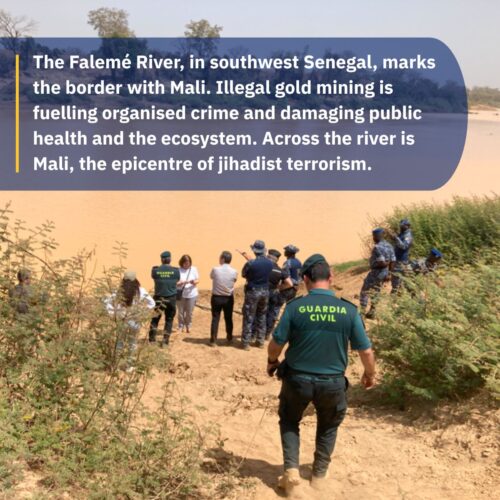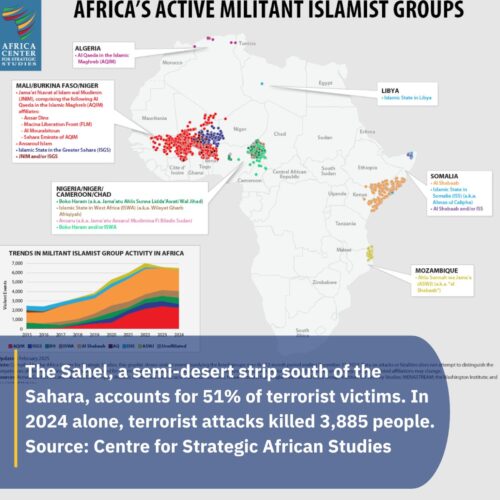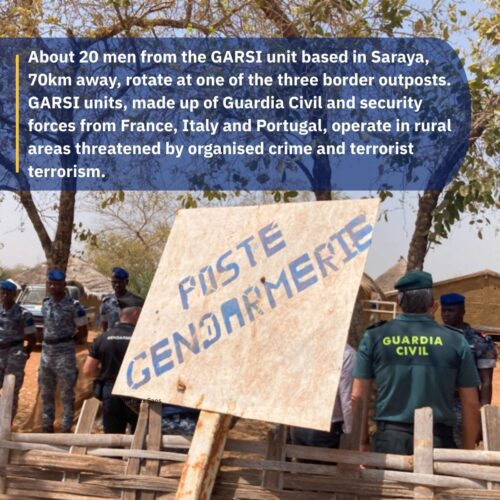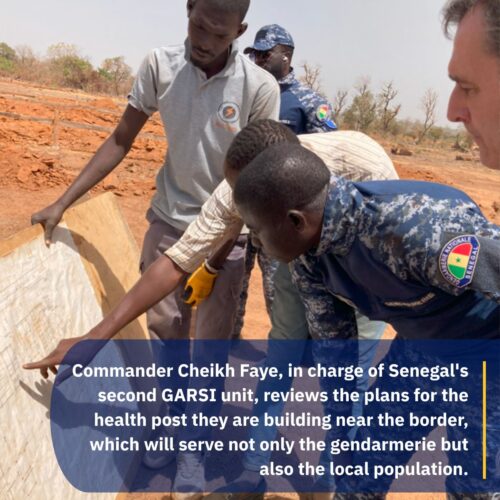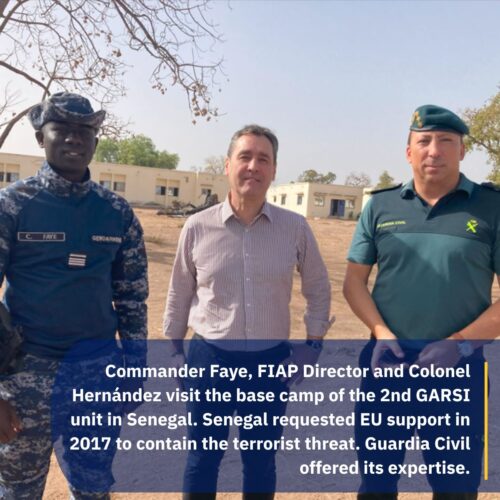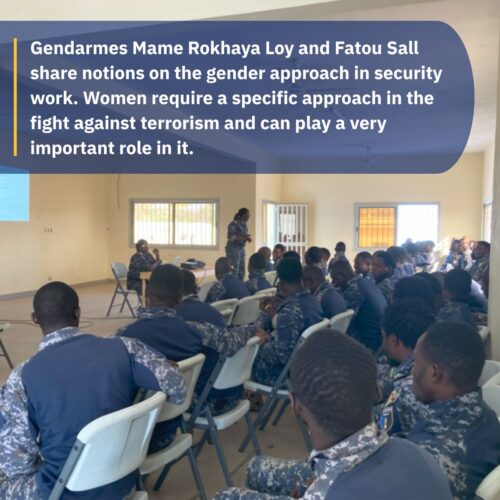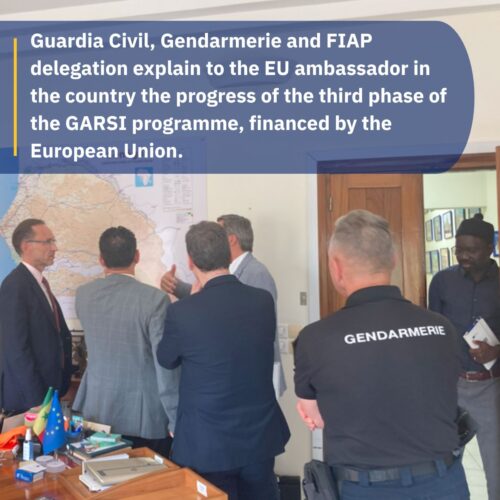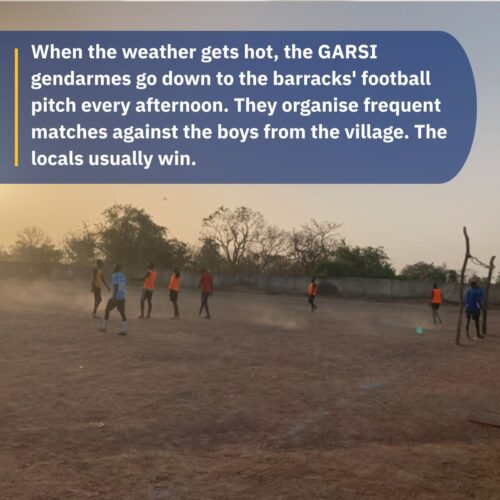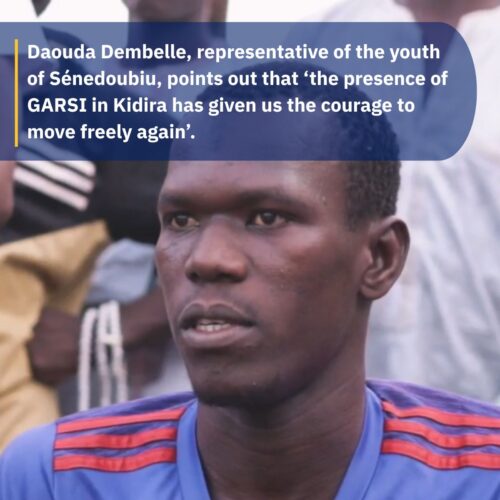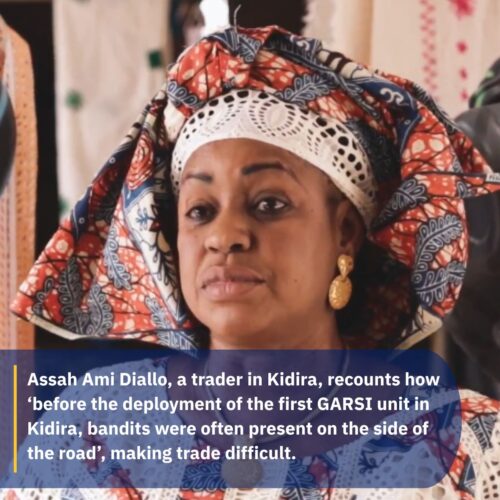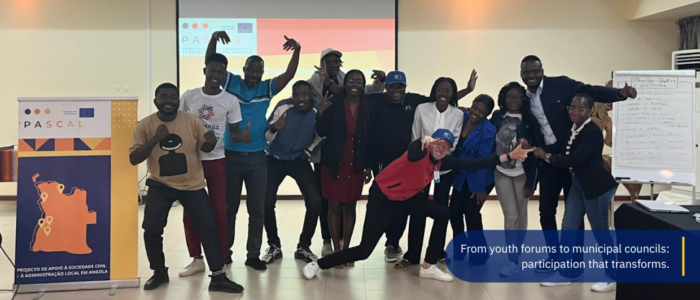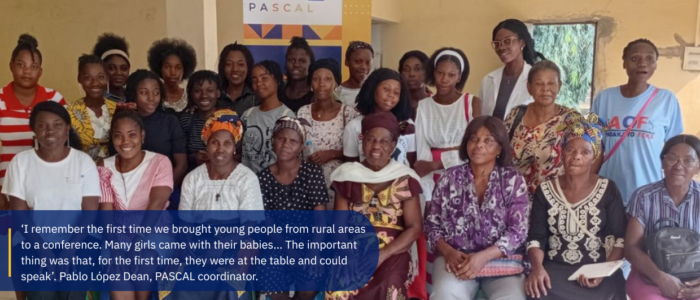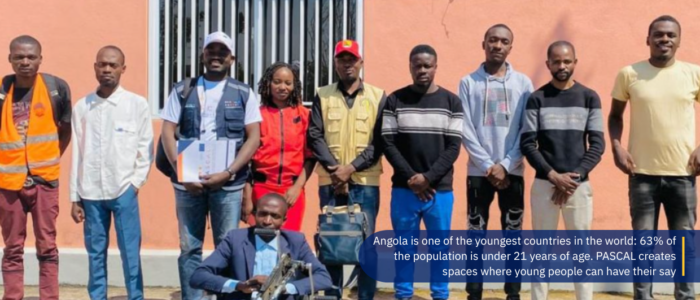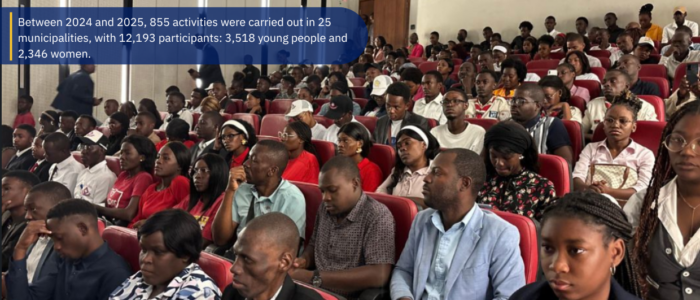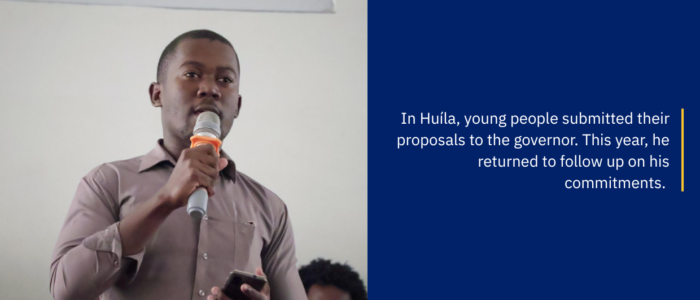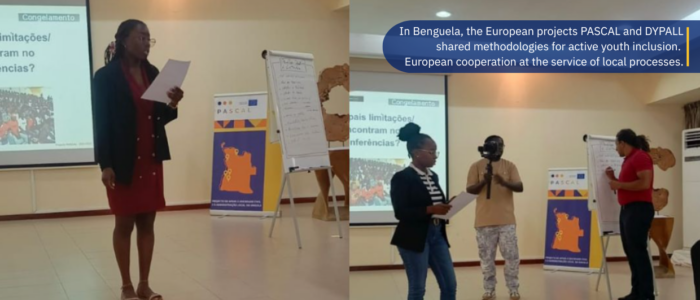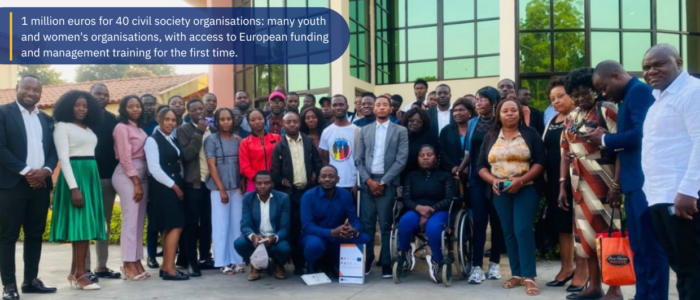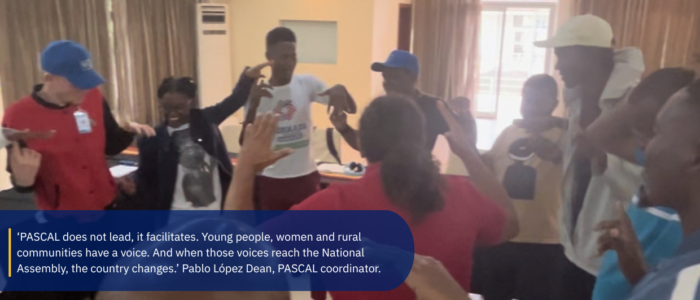-
|
17 December 2025
|Posteado en : Reportage
We close another year full of achievements in public cooperation, in which our institutions and our public expertise have been the driving force behind the continued strengthening of public systems around the world.
Another year that confirms the value of exchanging knowledge, best practices and experiences to promote and improve public policies that enhance the lives of people and the planet.
We persevere: we begin 2026 with the firm conviction that cooperation is a key tool for moving towards a more just, secure and sustainable future with cohesive societies.
Here we highlight some of the major achievements made this year in the green agenda, digital agenda, trade, security, equality, social and territorial cohesion, participation, youth, drugs, food, work, public governance, migration, justice and the rule of law, and public expertise.
✨ View the complete infographic here.
🌿Green Agenda
-Panama: extension of the electricity grid and integration of renewable energies and storage systems into the National Interconnected System.
-Mexico: meeting between Mexican and Spanish municipalities on low-emission zones for the development of municipal reduction plans.
-Paraguay: exchange of experiences with Spain on wetland management.
-Colombia: regulatory proposal for institutional climate architecture.
-Caribbean: training on Copernicus Earth observation in the Caribbean and with the European Centre for Medium-Range Weather Forecasts (ECMWF) to improve resilience to natural disasters.
-Caribbean: organisation of the 3rd EU-Caribbean Global Gateway Conference on Sargassum, at which three countries (the Dominican Republic, Mexico and Grenada) committed to collecting and reusing 660,000 tonnes of sargassum.
📲 Digital Agenda
-Cuba: creation of the Digital Government Centre, which will lead digital government in the country, with European approaches to governance.
-Caribbean: strengthened institutional capacities on digital transformation, digital government and cybercrime.
-Costa Rica: national model of health data governance to manage health data in a secure, interoperable and ethical manner, in line with international standards.
-Horn of Africa: technical assistance and training of trainers in digital change management.
🚙 Trade
-Sierra Leone: comprehensive assessment of its readiness for the African Continental Free Trade Area (AfCFTA), with a roadmap to diversify exports, strengthen trade institutions and encourage the participation of SMEs, women and young people in intra-African trade.
-African Union: four new National Assessments of the African Mining Vision consolidated, promoting sustainable, transparent and inclusive management of the continent’s mineral resources.
-Serbia: creation of a digital platform to record intellectual property rights infringements, thus ensuring compatibility with EU standards.
-Latin America and the Caribbean: bi-regional dialogues with the EU on sustainable value chains (cocoa, soy, coffee, livestock and palm oil) to adapt to the European Union Deforestation-Free Regulation (EUDR).
🟣Equality
-Paraguay: creation of an inter-institutional committee for the prevention of violence against women in two departments.
👐🏽 Social and territorial cohesion
-Mexico: expansion of the State Fiscal Model for Social Cohesion from 24 to 31 federal entities to strengthen revenues, their formality, improve the quality of spending and transparency.
-Mexico: creation of a Diploma in Professionalisation and Training for Federal and State Labour Inspectors and three Regional Committees for decent work, formalisation and employability.
🙋🏽♀️Participation
-Angola: consolidation of provincial and municipal youth forums as spaces for dialogue and creation of a Network of Women Leaders in Local Governance.
💊 Drugs
-Cuba: creation of the National Drug Observatory for information, scientific research and early warning aimed at formulating evidence-based public policies.
-El Salvador, Colombia, Ecuador, Honduras, Dominican Republic, Paraguay and Bolivia: strategies for the treatment, management and final disposal of precursors and other chemicals to improve traceability, operational safety and responsible environmental and public health management.
-Chile: social innovation laboratory to improve care for minors in state custody with problematic drug use. Incorporation of mental health and self-care elements for therapeutic carers in residences collaborating with the protection system.
-Central Asia: response systems in five countries, with manuals and guides integrated into national drug strategies.
-Kyrgyzstan: prison reform and training for staff working with people who use psychoactive substances.
🥕 Nutrition
-Latin America and the Caribbean and Africa: presentation of specific nutrition commitments by 33 countries at the Nutrition for Growth Summit (Paris, March 2025).
👷🏽♀️ Work
-Moldova: draft amendment to national legislation that will enable the introduction and operation of the European Health Insurance Card (EHIC).
🏛️ Public governance
-Brazil: public innovation laboratories in institutions, developing innovation skills and capabilities to address complex public problems.
⚖️Justice and the rule of law
-Perú: estrategia nacional contra la ciberdelincuencia y proyecto de ley para recabar y preservar la evidencia digital.
-Bolivia: proposal for disciplinary regulations for the judiciary, aimed at transparency, accountability and the consolidation of an independent judicial career.
-Latin America and the Caribbean: design of the first model law on crimes committed with artificial intelligence.
-Latin America and the Caribbean: creation of the Diamante police network to coordinate with the EU in the fight against illicit drug trafficking and the Cibel@ network to combat cybercrime.
-Latin America and the Caribbean: guide to investigation, evidence and case law related to child sexual abuse.
-Latin America and the Caribbean: regulations on the financing of political parties with cryptocurrencies.
-Latin America and the Caribbean: establishment of the ECI Channel, so that European experts can support the creation of joint investigation teams between authorities in the two regions.
-Caribbean: regional strategic plan against cybercrime.
-Serbia: legal framework for the recovery of criminal assets in line with the EU acquis and task force against organised crime and money laundering.
-Albania: organisational reform of the courts and adaptation of regulations to EU standards.
-Middle East, North Africa, Sahel and Horn of Africa: creation of Central Authorities for international judicial cooperation and between the League of Arab States and Eurojust. Creation of the Sphinx Network of intelligence, judicial and investigative experts on counter-terrorism.
🔐 Security
-Mauritania: restoration of security by GARSI units in border areas with Mali, reviving commercial activity.
-Senegal: operations against illegal gold mining and related crimes (child labour, trafficking, environmental damage).
-Senegal: 25 operations against human trafficking networks.
-West Africa: consolidation of the Netcop system with eight active national investigation units from five countries to exchange cross-border information on human trafficking and smuggling.
-Senegal: creation of a maritime division within the National Police (DPAF) and reinforcement of the Gendarmerie’s naval component for early intervention, assistance and deterrence at critical points, reducing risks to people at sea and to deployed units.
-Africa and the Indian Ocean: regional network of focal points for national drug observatories on consumption and supply, which will lead to a regional observatory.
-Latin America, Caribbean and West Africa: intelligence-sharing platform on illicit maritime trafficking.
-Nigeria, Benin, Gambia: 199 civil society organisations are participating in defining needs to prevent electoral violence, with a special focus on the coordinated fight against disinformation and the dissemination of citizens’ political rights.
🧳 Migration
-Colombia and Ecuador: Operational Protocol for Action and Referral, with protection routes for people whose human rights have been violated or who are at risk, such as victims of cross-border crimes and vulnerable groups.
🔵 Public Expertise
-Public Expertise: 494 public sector professionals mobilised in international cooperation projects with FIAP (7% more women in the last year). This contribution to multilateralism was the focus of the annual International Public Administration Day event.
-Integrity: we have built an Internal Ethics Information System, with a revised code of ethics and a reporting channel in four languages available on our website, thereby strengthening our compliance system and our integrity as a core value.
-
|
01 December 2025
|Posteado en : Reportage
The PASCAL Programme is succeeding in opening up real opportunities for participation for thousands of young people and women in Angola.
In the Baú neighbourhood of Catumbela, on Angola’s coastline, the nights are dark and water still has to be fetched from far away. During the colonial era, Catumbela was a sugar and industrial enclave. Today, it remains a municipality with an agricultural tradition, but with serious deficits in basic services. Luzia, 22, shares a roof with her grandmother Julia, who at 62 still supports ten grandchildren with her work in the fields. Amidst the shortages and daily struggles, Luzia has found a space to raise her voice in the PASCAL project.
‘It is in these projects that we have a voice. Before, I didn’t know I could talk to the administration, but now I know it is my right,’ says Luzia, who is part of the Associação Projeto Cidadania. For her, participating means much more than attending a meeting: it means presenting proposals on problems in her community, ‘such as lighting or sanitation,’ and seeing that the administration is beginning to listen to them.
Her story reflects what the PASCAL project is achieving in Angola: opening up spaces for real participation for thousands of young people and women who for years were excluded from decision-making.
In her community, Luzia explains what it means to participate:
“I participate because this is where we can talk about the shortcomings of our neighbourhood. If only one citizen complains, they are not heard; but if we do so on behalf of the project, with training and knowledge, our voice reaches further.”
The Civil Society and Local Administration Support Project (PASCAL) was launched in 2021 in response to the major challenge of decentralisation in Angola. Funded by the European Union and managed by a European consortium led by FIAP (Spain) and the Central Project Agency of Lithuania (CPVA) in collaboration with the Angolan Ministry of Territorial Administration, its purpose has been to support the implementation of the new Political-Administrative Division Law, strengthen the capacities of local administrations and open permanent channels of dialogue between Parliament, municipal governments and civil society. In short, to create the conditions for future local authorities to be built on solid, inclusive and participatory foundations.
What Luzia is experiencing reflects a broader change that is already being felt throughout the country. Between 2024 and 2025, more than 12,000 people participated in PASCAL activities, of whom 3,518 were young people. In provinces such as Huíla, hundreds of young people gathered in youth forums and submitted their proposals directly to the governor. According to Teófilo Silvestre, PASCAL’s specialist in governance and public innovation, ‘Today, young people and women are sitting face to face with MPs and governors. That has never happened before.’
For Teófilo, the most significant results of the project include ‘the trust built with strategic institutions such as the National Assembly and the government itself; capacity building in the 25 municipalities involved; the activation of spaces for citizen participation, such as consultation and coordination councils; and the training of local administration teams in open government, planning, transparency and accountability.’
These advances are reflected in practice: more than 50 MPs participated in training courses and study visits on decentralisation, while more than 450 officials from 25 municipal administrations have already been trained in participatory governance and gender-responsive budgeting.
Female participation has also increased significantly. 2,346 women were involved in the project’s activities. According to Analdina Nouemou, gender officer at PASCAL:
“Many women did not know that participating in local councils was a right. Now, even in rural areas, they are organising themselves into groups and taking their proposals to the authorities.”
From Catumbela, community leader Maria Joana Lopes da Silva confirms this:
Women are no longer just providers for the household. They also make decisions about lighting, sanitation, and education in their communities.
The government itself also recognises the progress made. According to Teresa Quiviénguele, Secretary of State for Territorial Administration:
“The PASCAL initiative is of great interest to the Angolan Government, because in our National Development Plan 2023–2027 we are committed to the decentralisation of public services and greater citizen participation in public life. With this support, we are strengthening the institutional capacity of local administrations to expand opportunities for citizen participation and involvement.”
The project has brought together actors who previously had little contact with each other. Members of the National Assembly, municipal administrators and civil society have participated in workshops and forums, with learning taking place in both directions. And the municipalities are beginning to feel the impact. Paulino Banja, administrator of Cubal, explains it clearly:
“With PASCAL, we have held meetings with young people and authorities, which has greatly boosted participation. Women themselves are expressing their rights, and that is a huge step forward for our municipality.”
The results also reach those who monitor and report on what is happening in communities. Augusto Manuel, a journalist in Benguela, sums it up as follows:
‘The training we received gave us the tools for more community-based journalism. Today we can go to neighbourhoods, listen to people, denounce inefficiencies and report on the poverty that exists. This sheds light on the reality of the country.’
This work has strengthened a network of citizen journalists that now publishes reports from municipalities, amplifying the voice of civil society and reinforcing transparency.
The same momentum has been seen in the Network of Women Leaders in Local Governance, which has enabled dozens of women to take on a more active role in community councils and decision-making spaces.
The numbers confirm this: 2,346 women have participated in PASCAL activities and 14 civil society organisations have accessed European Union grants for the first time, enabling them to launch eight projects.
This process has not only increased women’s confidence and leadership, but has also transformed the local agenda: today, community priorities include issues such as childcare, water and security, which are directly linked to women’s demands.
The numbers speak for themselves: 855 activities promoted in 25 municipalities, 40 organisations supported with €1 million in grants and growing trust between institutions and citizens. As Pablo López Dean, coordinator, points out
“Over the past four years, the project has achieved real successes, both in building trust between institutions and civil society, and in opening up spaces for dialogue and gender equality. Decentralisation is a process that requires time, trust and dialogue. The important thing is that no one is left behind.”
For Luzia, the change is not only community-based, but also personal:
‘I participate because I don’t want to stand still. In these projects, we find the voice to speak our minds. And thanks to the training, I now feel more confident. My dream is to be an entrepreneur and help other young people to become entrepreneurs too.’
Europe, Africa and Latin America: an exchange that transforms
One of PASCAL’s fundamental pillars has been the exchange of experiences between public administrators from different continents and levels of government.
‘The project is aligned with the strategies of the Angolan Government and the European Union, and seeks to promote participatory governance based on people, where everyone has a space to speak and, most importantly, where no one is left behind,’ explains Pablo López Dean, project coordinator.
Over the past four years, Angolan MPs and representatives of the public administration have travelled to Spain and South Africa to learn about models of decentralisation and participatory budgeting and to work with the Southern African Development Community (SADC) as a regional benchmark in inclusive legislation. Europe also contributed its expertise from Spain through the Ministry of Territorial Policy and Democratic Memory, INAP, the Youth Institute, the Spanish Federation of Municipalities and Provinces, and from Lithuania through the National Forum on Disability, the Youth Council and the Institute of International Relations and Political Science, among other institutions.
Angola has thus connected to a broader network of practices and learning that transcends borders, confirming that cooperation not only provides funding, but also creates community and trust.
For FIAP, this project reflects its added value: putting the knowledge of European public administrations at the service of cooperation, creating spaces of trust and dialogue between peers. As FIAP Director Francisco Tierraseca points out:
‘Institutional innovation in dialogue and the co-creation of public policies is one of FIAP’s main contributions: opening up new channels between parliaments, administrations and citizens, accompanying processes with evidence and international best practices.’
Laura Cárdenas, communications consultant for this PASCAL Project activity
-
|
01 October 2025
|Posteado en : Reportage
‘I remember the first time we brought young people from rural areas to a provincial conference. Many girls came with their babies. The children cried in the middle of the debates… and nothing happened. It was part of life, part of Angolan reality. The important thing was that, for the first time, these young women were sitting at the table and could speak,’ says Pablo López Dean, coordinator of the PASCAL project.
That image sums up the transformation that the project is promoting in Angola: opening up spaces for real, inclusive and unfiltered participation for a young, female and diverse civil society.
The PASCAL project (Support to Civil Society in Local Governance in Angola) is a European Union initiative that seeks to strengthen citizen participation in the country’s decentralisation processes. It is implemented through a European consortium led by FIAP and the Central Project Agency of Lithuania (CPVA), in close collaboration with the Angolan government through the Ministry of Territorial Administration and civil society organisations. Its mission is not to impose agendas, but to facilitate capacities, open spaces for dialogue and accompany the transition towards more inclusive and participatory governance with technical evidence.
Young people have their say
Angola is one of the youngest countries in the world: 64% of the population is under 25. But for years, young people have been marginalised from decision-making. PASCAL has created processes to change that.
Between 2024 and 2025, the project facilitated more than 855 activities in 25 municipalities, with the participation of 12,193 people in those organised by the focal points alone, of whom 3,518 were young people (29%) and 2,346 were women (19%). In addition, provincial youth forums were organised in the five provinces of intervention, bringing together 200–250 young people per meeting and representatives of municipal organisations in cascading dynamics that reached thousands more.
A clear example is the process carried out in the province of Huíla. ‘One of the most obvious results is the creation of provincial forums where young people were able to present their concerns and needs and deliver them in an official document to the authorities. In Huíla, for example, they submitted their proposals to the governor, who is participating again this year to follow up on his commitments,’ explains Teófilo Silvestre, a specialist in governance and public innovation at PASCAL.
At the same time, the project has sought to draw on international experiences. In Benguela, for example, training was provided in August for civil society organisations involved in the Provincial Youth Days, led by Bruno António, executive director of the European network DYPALL, a European platform that works to strengthen youth participation in local decision-making. The meeting focused on methodologies for the active inclusion of young people in governance processes, strengthening the capacity of Angolan CSOs to work with and for young people.
These types of exchanges demonstrate the added value of PASCAL and European cooperation: putting the knowledge of international public administrations and networks at the service of local processes, creating spaces for trust and dialogue between peers.
Young women learning to claim their place
Participation is not only youthful, it is also female. Analdina Nouemou, civil society support specialist at PASCAL, sums it up as follows:
“Many women did not know that participating in local councils was a right. After the training sessions, they now approach municipal administrations, ask questions and make demands. Even women in rural areas with young children have learned how to organise themselves into groups and take their proposals to the administration. That is a profound change.”
In addition, thanks to the €1 million grant fund, 14 civil society organisations, many of them youth and women’s organisations, have accessed European funding for the first time, learning how to manage resources and strengthening their institutional self-esteem.
From the foundation to the future
The impact of PASCAL cannot be measured solely in numbers—although thousands of young people and women are already involved—but rather in processes that sow the seeds for the future. Civil society is becoming better organised, the authorities are listening, and, little by little, the historical silence of marginalised groups is being broken.
“PASCAL has built trust between institutions and civil society. It has professionalised local administrations and placed women and young people at the centre of governance. Today, citizen participation in Angola is more inclusive than ever,” says Teófilo.
In Pablo’s words: ‘PASCAL does not lead, it facilitates. They provide the voice: young people, women, rural communities. And when those voices are heard in the National Assembly or in government, the country changes.’
✍🏽 Laura Cárdenas, communications consultant for this PASCAL Project activity
PHOTO GALLERY:
-
|
02 September 2025
|Posteado en : Reportage
The digitalisation of education has become a national priority of Ukraine — not only to modernise curricula, but also to make learning accessible and resilient in times of war.
Since the beginning of Russia’s attacks, millions of Ukrainian students and teachers have been forced to adapt to disrupted learning environments. Schools have been damaged or destroyed, families displaced, and traditional teaching methods upended. In this context, digital education has emerged not just as a tool for innovation, but as a lifeline for maintaining educational access across regions.
Digital platforms, cloud-based resources, and remote learning technologies have made it possible to preserve the right to education, even in bomb shelters, evacuation zones, or when separated from school communities. Moreover, in an era where digital transformation shapes national resilience and competitiveness, education plays a central role — cultivating the knowledge, skills, and adaptability needed to rebuild the country and shape its European future.
IT Studios: A New Era for Informatics Education in Schools
Among the flagship digital educational initiatives is IT Studios, developed by the Ministry of Digital Transformation of Ukraine and the Ministry of Education and Science of Ukraine in cooperation with the EU-funded project EU4DigitalUA, implemented by FIAP.
These studios offer reimagined informatics lessons that integrate digital materials and practical skill-building for school students of 1–11 grades. The IT Studios platform provides:
-Over 500 interactive exercises
-320+ educational sessions
-Modules ranging from digital literacy, and media creativity to computational thinking and programming
“IT Studios is a rethought approach to teaching computer science through digital educational materials for students and teachers, with maximum focus on practice and application of skills in real situations. More than 30% of the country’s educational institutions already use IT Studios in the educational process. Educational resources of modern informatics change the idea of modern education and lay the foundation for the future, where technology becomes the driving force of the country’s development,” said Valeriya Ionan, Advisor to the First Deputy Prime Minister of Ukraine on Innovation, Digitalisation & Global Partnerships, Ministry of Digital Transformation of Ukraine.
Cooperation to boost digital education in Ukraine
The EU4DigitalUA project stands as a pivotal initiative supporting Ukraine’s journey toward an innovative and inclusive digital society. Funded by the European Union, the project has been advancing digital learning and institutional capacity building in Ukraine since 2020 — with a clear mission: to bring international expertise, modern tools, and European values into the core of Ukraine’s digital governance and education systems.
The main goal of EU4DigitalUA is to increase Ukraine’s competitiveness through transparent, citizen-centered digital governance. With the Ministry of Digital Transformation of Ukraine as the primary beneficiary, the project focuses on three key pillars which are implemented by FIAP:-Institutional strengthening and capacity development
-Communication and public awareness
-Data protection
By equipping both public officials and the younger generation with 21st-century digital skills, EU4DigitalUA helps lay the foundation for Ukraine’s sustainable development and European integration.
AI Knowledge in Ukrainian Schools
As AI tools become increasingly integrated into everyday life, Ukraine is taking steps to bring them into the classroom. A joint study by Projector Creative & Tech Institute and the Junior Academy of Sciences of Ukraine, conducted in September–October 2023, sheds light on the current landscape of AI usage in Ukrainian education.
This gap points to a critical need for ongoing teacher training and support — an area where EU4DigitalUA’s initiatives like CDTO Campus and digital upskilling programs continue to play a transformative role.CDTO Campus: Training Ukraine’s Digital Government Leaders
Beyond classrooms, EU4DigitalUA also plays a transformative role in public administration providing training programs on AI and personal data protection for CDTO Campus — Ukraine’s national learning initiative for Chief Digital Transformation Officers (CDTOs) and their teams in government and public bodies.
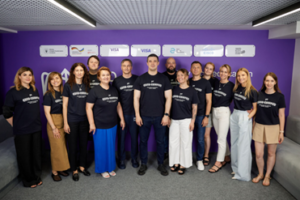
Designed to build high-level digital leadership, the Campus offers training in numerous educational programs in GovTech, cybersecurity, and artificial intelligence, adapted to the modern requirements of public administration.
One of the most recent programs delivered through CDTO Campus was “EU4DigitalUA: Implementing AI in e-Government”, completed in May 2025. This course was tailored for civil servants and focused on:
-AI adoption strategies in public administration
-Ethical and legal frameworks aligned with EU standards
-Best practices from Spain and other EU countries
-Practical use cases and adaptation for the Ukrainian context
Spanning eight comprehensive modules, the course combined lectures from international experts, group discussions, and hands-on case studies.A Path Forward: AI in the Classroom and Beyond
As part of its long-term strategy, the Ministry of Education and Science of Ukraine has published practical guidelines for integrating AI into school curricula. These include safe usage recommendations, toolkits for teachers and students, and strategies for ethical use and responsible AI adoption. In this context, digital literacy plays a pivotal role as a driver of Ukraine’s innovation economy. With a reputation for producing top-tier tech talent, Ukraine is leveraging digital education to accelerate its recovery.
From transforming how schoolchildren learn informatics, to training the next generation of public digital leaders, EU4DigitalUA initiatives reinforce the importance of education as the backbone of digital transformation. By fostering digital literacy, supporting AI integration, and aligning with EU standards, EU4DigitalUA helps Ukraine build a resilient, future-ready state where knowledge and innovation drive the country forward on its European path.
✍🏽 Team of the project EU4Digital in Ukraine
-
|
30 July 2025
|Posteado en : Reportage
Every year, on 30 July, World Day Against Trafficking in Persons is commemorated to raise awareness of the situation of victims of human trafficking and to promote and protect their rights.
Human trafficking is a serious crime that affects millions of people around the world, and this day seeks to mobilise efforts to prevent it, protect victims and prosecute those responsible. Furthermore, in a context of armed conflict and migration flows, it is particularly important to prioritise the protection of victims of trafficking.
A philosophical analysis of public policy design from a humanistic perspective leads us to commit to adapting these policies to people’s needs, for the common good, and where an educated and trained society is essential for governing with justice. In designing public policies aimed at combating human trafficking, it is essential to understand the political dynamics, i.e., to know the decision-making processes, the key actors involved and the factors that influence implementation. This knowledge is necessary in order to apply what is known as a victim-centred approach.
The victim-centred approach, also known as the victim-focused approach, prioritises the needs and concerns of victims, placing them at the centre of attention and processes. The main objective is for victims to regain control over their lives and for the services offered to them to be empathetic and free of prejudice, avoiding processes of revictimisation.
This approach seeks to empower victims, strengthen their resilience and therefore their ability to adapt, and help them recover their family and personal spaces.
In order for this approach to be applied in all key processes in the fight against human trafficking (prevention, protection and criminal prosecution), it is important that all actors in contact with victims have a better understanding of their experience. This better understanding comes from ongoing training aimed at improving knowledge of the problems faced by victims and their specific needs, thereby generating greater awareness and empathy among public servants.
In addition to this specialised training, it is necessary to eliminate elements of revictimisation from the processes, especially during the criminal investigation of the crime, where, for example, victims are forced to repeatedly repeat interviews in which they are forced to repeat and relive the moments of exploitation they have experienced. Victims are a very important source of intelligence, as they have access to information that is highly relevant to the criminal investigation process. However, respect and non-revictimisation cannot be subordinated to the extraction of information. For this reason, it is essential that comprehensive care and protection services are provided as soon as a victim is identified.
Through its project in Bolivia, FIAP works in coordination with the institutions that make up the Plurinational
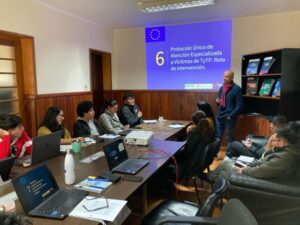 Council for the Fight Against Human Trafficking and Smuggling, supporting and strengthening the powers that each institution has under Comprehensive Law 263 on the fight against human trafficking and smuggling.
Council for the Fight Against Human Trafficking and Smuggling, supporting and strengthening the powers that each institution has under Comprehensive Law 263 on the fight against human trafficking and smuggling.To reinforce the application of the victim-centred approach, we have collaborated with both the Ministry of Justice and Institutional Transparency and the Public Prosecutor’s Office in the design and dissemination of the Single Protocol for Specialised Care for Victims of Trafficking and Intervention Route. This Protocol is a set of guidelines and procedures that establish how institutions should act to provide comprehensive care and protection to victims of human trafficking, guaranteeing respect for their rights and promoting their recovery and social reintegration, i.e., the application of the victim-centred approach.
In addition, the design of a diploma course on the prevention and protection of victims of human trafficking has just been completed, which substantially improves the specialised training offered to Bolivian public officials on this crime and on the application of a victim-centred approach.
Santiago Santos
Project Director, Fight Against Human Trafficking, Smuggling of Migrants and Related Offences in Bolivia
-
|
23 April 2025
|Posteado en : Reportage
The waters of the Falémé River, which separates Senegal from Mali in the province of Kédougou, have a strange ochre colour. They flow slowly in a dystopically silent landscape. No children splashing in its waters, no trace of women washing clothes.
When you ask about this rare calm, there are two explanations:
–GOLD. In recent years, illegal gold mining has soared in these lands, which account for 98% of the country’s mines, and with it criminality. Gold, as so many African countries have witnessed, is not only a source of violence. It also brings public health problems and damage to the ecosystem (aquifers, crops, etc.), due to the mercury used to process it.
–JIHADIST TERRORISM. Mali has become the epicentre of jihadist terrorism in the last decade. The map below shows the concentration of armed groups across the river in Mali. Raids are frequent and Senegal has asked the EU for help in containing the threat.
Between the violence of the precious metal, organised crime and terrorism, some 150,000 people are trapped between the violence of the precious metal, the violence of organised crime and terrorism, and increasingly, going to the market, to school, to fetch water from the well or to a health post is a risky activity.
Sharing Spain’s experience in the fight against terrorism
The Senegalese state and its gendarmerie requested EU support in 2017 to protect the country from growing destabilisation. The Sahel, the semi-desert strip south of the Sahara that crosses Africa from west to east, is home to 51 per cent of the world’s victims of terrorism. In 2024 alone, 3885 people were killed in terrorist attacks there, according to data from the Global Terrorism Index.
Four countries agreed to collaborate with the Senegalese Gendarmerie: Spain, France, Italy and Portugal. Their security forces offered their knowledge and experience to adapt to the Sahel countries a proposal that had been successful in Spain in the fight against terrorism.
‘The GAR doctrine (Rapid Action Groups of the Guardia Civil) develops working procedures and missions based on the basic characteristics of these units: mobility, self-sufficiency, robustness and polyvalence. They are units that dispute the terrain with criminals and terrorists, limiting their freedom of manoeuvre in the most inaccessible geographical areas, where impunity is rife, regaining the initiative in the field and forcing these violent groups to protect themselves from police action and avoid the civilian population. This is how the beginning of the end of ETA began, when it ceased to be safe in the countryside and to move with total impunity,’ are the words of Colonel Miguel Ángel Hernández, who since 2024 has been directing the third phase of the European GARSI project, implemented by a European consortium and led by Spain. Hernández, who is from the Canary Islands, has previously worked in international missions with the United Nations in Guatemala and Haiti. This after more than 15 years of direct experience in the fight against ETA.
International cooperation between security forces: the security-development nexus
In February 2025, the colonel travelled to Saraya, where the country’s second GARSI unit is being formed, together with the director of the Foundation for the Internationalisation of Public Administrations (FIAP), Francisco Tierraseca. ‘I have been able to see in situ the enormous involvement of Senegal in this project. After the stabilisation of the area and the successes achieved by the first GARSI unit in Senegal, in Kidira, the gendarmerie has not even waited for the official start of the project: they have already built the basic installations for the 300 men who will make up the GARSI unit in Saraya, and the gendarmes of Kidira themselves came down here to begin the basic training of the Saraya gendarmes,’ Tierraseca said, who also stressed the importance of this border for the stability of Senegal, its own development and also security in Europe.
The mission is accompanied by Brigadier General Emmanuel Gerber and Mario Farnós, lieutenant of the Guardia Civil and institutional coordinator of the project in Senegal and Mauritania. Emmanuel has previously participated in multiple international missions, including Central African Republic, Chad, Lebanon and Bosnia-Herzegovina.
In constant movement
Commander Cheikh Faye of the Senegalese gendarmerie welcomes them warmly and shows them on the spot how well the work is progressing at the new Saraya barracks. He then accompanies them to one of the three mobile points deployed at the border, which can only be reached via 70 km of winding tracks shaken by dust and sand.
Mario tells us about the main characteristics of these units, what makes them different from classic gendarmeries: ‘they are units trained to work in continuous mobility, oriented towards direct contact with the population and with very specific training in areas such as physical training, explosive ordnance disposal, logistics and maintenance, judicial police, information, drone handling, explosive device detection, environmental crimes, etc.’.
Emmanuel provides the framework for the trainings that are taking place this month: human rights and the gender approach. They are given by a person in charge of the United Nations Office on Drugs and Crime (UNODC), a Senegalese magistrate and two women commanders of the Senegalese National Gendarmerie. Beforehand,’ he explains, ’we carried out basic training, which generated a great sense of belonging and teamwork in the unit, and also the training of trainers, a key strategy for multiplying knowledge and reaching large groups of gendarmes.
Solomonic solution
The hours on the road from Dakar to Kédougou, then to Saraya, then to the border are long. In the car, we share conversations and reflections. About the need to generate security to build development, about the key moments in the fight against ETA and what it was like to be a Guardia Civil in the Basque Country, about the living conditions in these units, about the baobab trees and also about the relations between different countries that share more and more common challenges. For Tierraseca, humility and creativity in finding solutions adapted to each context are key in this form of cooperation.
Sometimes, however, with so many roads in between, consensus can only be reached through Solomonic solutions. Like the one forged by Mario and Malik, the driver: as far as Kaffrine (halfway), we drive to the rhythms of Guinea Bissau and Cameroon that Malik chooses on the radio. From Kaffrine to Dakar we return with Estopa.
Kidira, the first GARSI unit in Senegal
Senegal’s first GARSI unit was created in January 2019, in Kidira, with 150 gendarmes. The reactivation of the local market and the arrest of human traffickers and illegal gold miners are among the main results. Between 2019 and 2022, the unit’s infirmary provided more than 2,500 consultations for the local population.
Daouda Dembelle, representative of the youth of Sénedoubiu explains it in a nutshell: ‘the presence of GARSI has given us back the courage to move freely again’. Assah Ami Diallo, a trader in Kidira, recounted how the presence of bandits on the side of the road used to be frequent. The headmaster of the Sénoudebou school, Maky Thiam, explains how ‘children from nearby communities have returned to school because they are no longer afraid of the road’.
Their testimonies are proof of the importance of a secure base for development.
✍🏽 Alicia García, Head of Communication at FIAP
PHOTO GALLERY:







